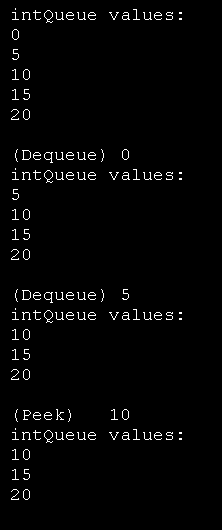Simple Demo for Queue: Enqueue, Dequeue and Peek

Imports System
Imports System.Collections
Public Class MainClass
Shared Sub Main(ByVal args As String())
Dim intQueue As New Queue( )
' populate the array
Dim i As Integer
For i = 0 To 4
intQueue.Enqueue((i * 5))
Next i
' Display the Queue.
Console.WriteLine("intQueue values:")
DisplayValues(intQueue)
' Remove an element from the queue.
Console.WriteLine("(Dequeue) {0}", intQueue.Dequeue( ))
' Display the Queue.
Console.WriteLine("intQueue values:")
DisplayValues(intQueue)
' Remove another element from the queue.
Console.WriteLine("(Dequeue) {0}", intQueue.Dequeue( ))
' Display the Queue.
Console.WriteLine("intQueue values:")
DisplayValues(intQueue)
' View the first element in the
' Queue but do not remove.
Console.WriteLine("(Peek) {0}", intQueue.Peek( ))
' Display the Queue.
Console.WriteLine("intQueue values:")
DisplayValues(intQueue)
End Sub
Public Shared Sub DisplayValues(ByVal myCollection As IEnumerable)
Dim myEnumerator As IEnumerator = myCollection.GetEnumerator( )
While myEnumerator.MoveNext( )
Console.WriteLine("{0} ", myEnumerator.Current)
End While
Console.WriteLine( )
End Sub 'DisplayValues
End Class
Related examples in the same category